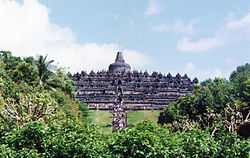Our website is made possible by displaying online advertisements to our visitors.
Please consider supporting us by disabling your ad blocker.
Wali Sanga
This article has multiple issues. Please help improve it or discuss these issues on the talk page. (Learn how and when to remove these messages)
|
| Part of a series on |
| Religion of Java |
|---|
 |
Wali Songo (Javanese: ꦮꦭꦶꦱꦔ, lit. 'Nine Saints'), also transcribed as Wali Sanga, are revered saints of Islam in Indonesia, especially on the island of Java, because of their historic role in the spread of Islam in Indonesia. The word wali is Arabic for "trusted one" or "friend of God" ("saint" in this context), while the word sanga is Javanese for the number nine.
Although referred to as a group, there is good evidence that fewer than nine were alive at any given time. Also, there are sources that use the term "Wali Sanga" to refer to saintly mystic(s) other than the most well-known nine individuals.
Each man is often attributed the title sunan in Javanese, which may derive from suhun, in this context meaning "honoured".[1]
Most of the wali were also called raden during their lifetimes, because they were members of royal houses.
The graves of the Wali Sanga are venerated as locations of ziarah (ziyarat) or local pilgrimage in Java.[2] The graves are also known as pundhen in Javanese.
- ^ Ricklefs, M.C. (1991). A History of Modern Indonesia since c.1300, 2nd Edition. London: MacMillan. pp. 9–10. ISBN 0-333-57689-6.
- ^ Schoppert, P., Damais, S., Java Style, 1997, Didier Millet, Paris, pp. 50, ISBN 962-593-232-1
Previous Page Next Page


